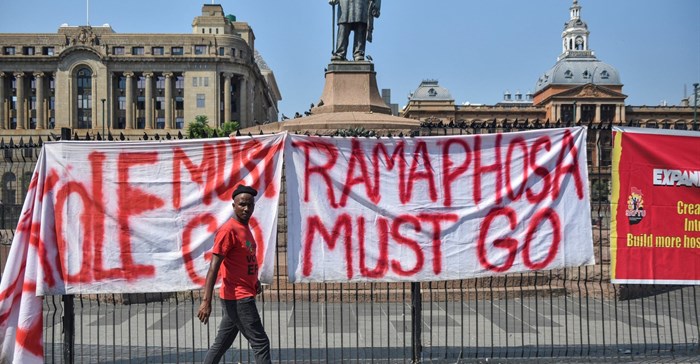This is the most successful shutdown ever in the history of striking.

Source: Reuters.
This was the message of Economic Freedom Fighters (EFF) leader Julius Malema, speaking from Church Square in Pretoria on Monday, 20 March, as thousands of demonstrators gathered nationwide to protest.
The EFF is calling on President Cyril Ramaphosa to resign and for an end to rolling blackouts.
"South Africans must realise that there is life outside of the ANC. The ANC is not a synonym of life; it is just another failed liberation movement," Malema said.
Malema said that there had been no looting or destruction of property during the national strike, and he slammed government for its narrative that the strike was unsuccessful. In his speech he said that those attending the strike and those who chose to continue to run their businesses instead are equally impacted by load shedding and want an end to it.
Malema framed government's deployment of SANDF members on the ground as an intimidation tactic aimed at stopping the national strike from happening. "Looting is not our mission; addressing load shedding is - addressing unemployment and poverty is. The whole world must know the shenanigans going on in this country. Our people stay in shacks; our people don't have water; our people don't have electricity."
He praised the bravery of those who showed up to strike in the face of "more than 3,000 soldiers on the streets, the more than 1,000 policemen deployed and the helicopters flying overhead".
Citizens reported that security forces were present at malls and roads.
Malema said government had sabotaged EFF's plan to strike by sending out an email to bus operators at 2am on Monday, 20 March, saying that they were no longer going to transport demonstrators to Church Square. "These buses are sponsored by government," Malema said. The EFF stepped in, Malema said, by paying for the strikers' transport to Church Square.
"The aim was to intimidate you," he said.
Addressing the demonstrators, he added: "It's time to say to all those dictators in Africa that their days are numbered. They want to arrest us, they will never kill or arrest our souls. We will die with our consciences and our souls intact. We will know that we never sold out."
Soweto under attack
In the meantime, leader of the Soweto Parliament Nhlanhla “Lux” Dlamini, claimed the EFF was behind an attack on his home
The attack reportedly happened in the early hours on Monday morning.
Dlamini said two bombs hit his home and that they completely shattered his windows and that of a neighbour's house.
He fingered the EFF saying EFF supporters had taken videos of his house the day prior, outing out his address and posting this on social-media platforms.
"It speaks to the quality of leadership in this country when people have a different viewpoint to you; when people beat you at your own game."
Dlamini said he stopped a shutdown in Soweto and that it was business as usual there.
"We worked tirelessly through the night with the police and the communities to make sure a granny can go to the shops; an ambulance can come and collect the granny that's having a heart attack, so that when the sun rises you've got a beautiful Soweto."
Gauteng reports the most arrests
Reports show that people began protesting as early as Sunday night, 19 March. By 10am on Monday, claims were that already 57 people around South Africa had been arrested in connection with the national shutdown, and that the numbers could escalate, while another account put the numbers down to more than 80 in the early hours of this morning.
At the time Minister of police, Bheki Cele said that Gauteng had recorded the most arrests so far with the Free State following close behind and Eastern Cape recording the third-highest number of arrests.
In Cape Town, the DA’s High Court victory prevented the EFF from closing down institutions. The City of Cape Town's Joint Operations Centre has had a multi-departmental plan in place to ensure communities, businesses and residents are kept safe during the national shutdown.
Brigadier Athlenda Mathe spokesperson for the National Joint Operational and Intelligence Structure said 24,300 tyres had been confiscated as early as Monday morning.
Law enforcement continues to monitor the national strike, which is expected to end at 00h00 on Monday, 20 March. It aims to prevent and combat any acts of lawlessness and criminality.









































